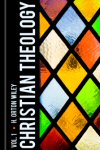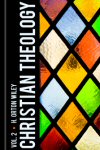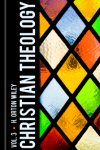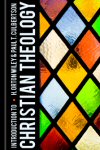H. Orton Wiley's Systematic Theology Collection (4 vols.)
Digital Logos Edition
Overview
H. Orton Wiley’s theology blends Arminianism with Wesleyanism. His magnum opus, Christian Theology, is still among the most widely used Methodist theological resources. It provides a clear articulation of Wesleyan-Arminian thought. Reflecting his tenure as a Nazarene pastor, college administrator, and school president, Wiley’s classic three-volume Christian Theology is presented here in full, together with a condensed version, Introduction to Christian Theology. Emphasizing both scholarly and practical elements, this four-volume collection is an excellent resource for pastors, theologians, and lay people alike.
In the Logos editions, these volumes are enhanced by amazing functionality. Important terms link to dictionaries, encyclopedias, and a wealth of other resources in your digital library. Perform powerful searches to find exactly what you’re looking for. Take the discussion with you using tablet and mobile apps. With Logos Bible Software, the most efficient and comprehensive research tools are in one place, so you get the most out of your study.
Get a full range of systematic theologies with the Systematic Theologies Collection (183 vols.).

Key Features
- Clearly articulates Wesleyan-Arminian beliefs on a range of issues
- Contrasts Arminian theology with Calvinist theology
- Includes a condensed version of Christian Theology emphasizing practical faith
Praise for the Print Edition
Probably the best Arminian systematic theology published in the twentieth century . . .
—Wayne A. Grudem, author, Systematic Theology: An Introduction to Biblical Doctrine
Product Details
- Title: H. Orton Wiley’s Systematic Theology Collection
- Publisher: Beacon Hill
- Volumes: 4
- Pages: 1,955
- Christian Group: Methodist/Wesleyan
- Resource Type: Systematic Theology
- Topic: Theology
Individual Titles
- Christian Theology, vol. 1 by H. Orton Wiley
- Christian Theology, vol. 2 by H. Orton Wiley
- Christian Theology, vol. 3 by H. Orton Wiley
- Introduction to Christian Theology by H. Orton Wiley and Paul T. Culbertson

The first volume of H. Orton Wiley’s systematic theology surveys Christian theology and the doctrine of the Father. In the introduction, Wiley explains the various branches of theology and the reason for his choice of systematic theology. He then details the development of theology throughout church history. Wiley defines what religion, revelation, inspiration, and canon is, and what their roles are in theology. His work on the doctrine of the Father first defines God, and then explores God’s existence, nature, divine names, personality, and attributes.

The second volume of H. Orton Wiley’s systematic theology concludes his study of the doctrine of the Father, which he began in volume one. Wiley then surveys the doctrine of the Son and the doctrine of the Holy Spirit. Wiley explains the moral and religious aspects of man as it relates to God through the study of anthropology (the science of man), hamartiology (the doctrine of Sin), and original sin (or inherited depravity).
He discusses how Christ’s redemption of mankind factors into his deity, humiliation, and exaltation. Wiley then details the offices of Jesus as prophet, priest, and king. He concludes with a study on atonement, as foretold by the prophets and fulfilled by Christ on the cross. His section on the doctrine of the Holy Spirit examines the role of the Holy Spirit and explains the involvement of the Holy Spirit in preserving a Christian in righteousness, sonship, and sanctification.

The third and final volume of H. Orton Wiley’s systematic theology surveys the doctrine of the church and the doctrine of the last things. In his discussion of the doctrine of the church, Wiley discusses the origin of the church, church polity, ministry, worship, and the sacraments. Surveying the doctrine of the last things, Wiley gives an overview of eschatology as it relates to death and immortality. He then goes on to defend his views on both the intermediate state (such as soul sleep and purgatory). He concludes with a study on the Second Coming, the Resurrection, last judgment, and final consummation.

In this volume, H. Orton Wiley and Paul T. Culbertson adapt Wiley’s three-volume Christian Theology into this brief, yet substantial, book. It is useful both as a textbook for introductory theology courses and a teaching tool for church congregations. Packed with Scripture references, it presents the Wesleyan-Arminian perspective in a devotional tone with practical emphasis.
This title is included in the following collections
You can save when you purchase this product as part of a collection.
Logos 9 Methodist & Wesleyan S...
$39.99$39.992025 Wesleyan Starter
$39.99$39.99Logos 9 Methodist & Wesleyan B...
$89.99$89.992025 Wesleyan Bronze
$89.99$89.99
- $349.99
- $349.99
- $349.99
- $349.99
- $349.99
- $849.99
- $849.99
- $849.99
- $849.99
- $849.99
- $1,499.99
- $1,499.99
- $1,499.99
- $1,499.99
- $3,953.40$2,370.99
- $5,017.57$2,999.99
- $2,999.99
- $2,999.99
- $4,749.99
- $10,417.33$6,249.99
- $10,999.99
- $21,749.99
- $23,999.99
- $24,999.99
About H. Orton Wiley
H. Orton Wiley (1877–1961) was an Arminian theologian associated with the followers of John Wesley and the Holiness movement. He pastored a Nazarene church before working in academia. In his scholarly career he was elected dean of the Deets Pacific Bible College, and then served as president of Nazarene University (currently Point Loma Nazarene University) and Northwest Nazarene College. He is the author of several books, and edited the weekly periodical Herald of Holiness from 1928 to 1936.
Reviews
5 ratings
Caleb Black
3/10/2021
Robert Chittenden
6/7/2020
Chris Figueroa
9/14/2018

Scott J Sherwood
5/23/2016
Ray Mills
2/25/2016